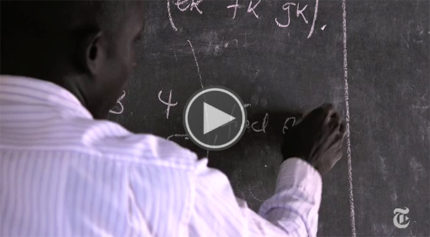
Students taking pictures at ALU
On September 29, 2017 African Leadership University (ALU) opened the doors to its second campus on the continent, ushering in a new era of innovative education to Rwanda. With a long-term goal of educating 3 million young Africans by 2060, Rwanda is the second campus in an ambitious plan to open 25 campuses across the African continent. The first campus opened in Mauritius in 2015. According to their website, ALU aspires to educate the next generation of ethical leaders who will push the continent forward.
ALU’s incoming class will spend their first year taking classes in the ‘Leadership Core,’ a custom curriculum designed to instill students with a set of core meta-skills, deemed necessary for survival in today’s job market. Among the core are classes on data and decision-making, as well as entrepreneurial leadership. The focus on these skills comes from research that shows a mismatch in university education and skills needed in the modern workforce.
ALU prides itself on innovative teaching and learning, delivering content through a flipped classroom model. Beyond just preparing students for work, ALU hopes to mold leaders who will take up the mantle of solving some of the greatest challenges facing Africa today. To this end, one of the programs being offered at ALU’s Rwanda campus is a Global Challenges degree.
The idea of Global Challenges is that it promotes mission-driven learning, allowing students to align their learning around a problem they want to solve. “Ultimately we want students to have a sense of their own mission, aligned with their purpose in life. And we have formalized this idea in a degree,” ALU founder Fred Swaniker told Atlanta Black Star.
ALU is a recent entry to a larger movement to reclaim and remake college education in Africa and across the globe. The #rhodesmustfall movement, which began in South Africa and quickly spread to other universities, has ignited a debate about decolonizing education. Joining the debate, one of the ALU faculty in Mauritius recently penned a viral article on decolonizing social sciences at an African university. ALU is primed to be at the center of this movement to reshape and redefine education in Africa in a manner that, as the name suggests, has both ‘Africa’ and ‘leadership’ at its center.
Along with retooling what education means in Africa, ALU hopes to increase accessibility to meet the rising demand of the continent’s surging youth population. There is a massive shortage of colleges and universities in Africa. Speaking to a new group of faculty and staff going through orientation in Mauritius, Swaniker stated, “Only 8% of Africa’s college-aged students are enrolled in college or university. The capacity does not exist. Africa would need to build 215 Harvard sized universities a year for the next 15 years in order to catch up to the 26% college enrollment rate of India.” He further stated that college enrollment in China is at 30% and the United States and Europe are over 60%. “Kenya, for example, graduates 600,000 high school students a year but only has the capacity for 50,000 students in its colleges and universities,” said Swaniker, just one example among many he offered highlighting the massive need for institutions like ALU.
In explaining to ABS, why he decided to enroll at ALU in Mauritius, second-year student Gitahi Kairuki explained that he felt ALU offered something no one else did. “I feel this is something that has never been done before in the sense of an African going to school in Africa, looking for African solutions to African problems. When you think about Africa’s brain drain in the past, you can see how this is a great opportunity.” Kairuki added, “One of the great things about being here is the ability to network with people from all over Africa. We have been kept apart by political ideologies but we all have the same goals. There is a very strong Pan-African feeling that comes with being here.”
Speaking to ABS on why African content and contextualization in the curriculum is so important, Nachula Wilson, a member of the Business Management faculty in Mauritius notes, “A lot of my friends went to African business schools. Most of what they were taught was based on a curriculum designed somewhere in the west. They learned western business management concepts and applications and then they graduate and end up unable to use it in their African work environment.”
Reflecting on her own education, Wilson states, “I learned about creative accounting through an in-depth study of American and UK financial scandals. And there’s nothing wrong with this except there were financial scandals happening right within my own environment, which is an entirely different world financially than the U.S.” She complains that she “did not get a chance to think around structures that can be put in place in the Zambian financial sector to prevent creative accounting. Instead, I learned how to do this for a company operating in the US.” Wilson spent years in the banking and finance sector before joining ALU. She is excited about the vision of the school and looks forward to molding graduates in the ALU business program who will “first and foremost be leaders who effect positive change on the continent.”
Discussing her experience so far, first-year student Mary Mwangi, from Kenya, states her first few weeks at ALU Rwanda caused fear and worry with the heavy workload, and that she was forced to re-examine who she thought she was. She states “I felt anger and frustration, but also excitement and freedom. Bombarded with all this, the natural reaction would be to break down and explode under the pressure. But at ALU, we are taught to take it in stride. We are stretched to the limit and then realize that we can stretch further, redefining our own limits.”
Students Odebode Tomiwa and Jerry Kariuki are both impressed by the different cultures, ideologies and philosophies they are exposed to at ALU. Fellow first-year student Joshua Mukinisha, from Rwanda, says that there is no other place to be for a student who wants to be challenged. “Here at ALU Rwanda, I’ve come to meet some of the most interesting, funny and intelligent students from across Africa. Besides the rigorous academic program, expression of one’s opinion is lauded and encouraged. I’m having the time of my life here.”
While ALU hopes to scale up its campuses in Mauritius and Rwanda to eventually have 10,000 students, the initial class in Rwanda is 300 students. Another unique feature of ALU is its diversity. Promoting itself as a truly Pan-African university, ALU has student representation from more than 30 African countries across its two campuses. The faculty and staff is nearly as diverse.
Along with Global Challenges, the Rwanda campus offers degree programs in International Business and Trade, Entrepreneurship, and Computer Science. The Mauritius campus offers Computer Science, Social Science, Engineering, and Business Management.


